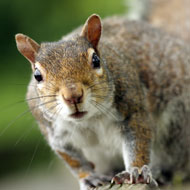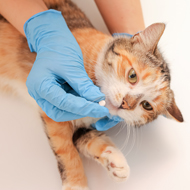Grey squirrels transmit the smallpox virus, which is normally fatal to red squirrels.
Red squirrels could be extinct in as little as 35 years
Thousands of volunteers are being recruited to help protect red squirrels by logging sightings, monitoring feeders and controlling grey squirrel populations.
The Wildlife Trusts’ ‘largest ever recruitment drive’ aims to increase volunteer numbers from 500 to 5000. The volunteers will work with partner organisations in their local area, submitting data to Red Squirrels United - a UK-wide network established to protect the reds - and the Saving Scotland’s Red Squirrels project.
“The Wildlife Trusts believe a healthy diverse natural world is vitally important to our society. Yet the diversity of our wildlife has reduced rapidly,” said Emma Robertshaw, a spokesperson for The Wildlife Trusts.
“Much of this has been due to habitat loss but the introduction of the grey squirrel from North America in 1876 has been the key factor in the drastic decline of our red squirrels. Without action, red squirrels are set to disappear from mainland England within a decade, and from Scotland in our children’s lifetime. So time is running out.”
Red Squirrel United Programme manager Dr Cathleen Thomas added: “In most of the UK there are only a handful of refuges left for red squirrels; without help, experts predict this beautiful and treasured creature could be extinct within as little as 35 years.”
Volunteers for the project will be asked to report grey squirrels moving into areas which are current strongholds for red squirrels. They will be required to log squirrel sightings, monitor feeders for reds, set up camera traps, and teach schoolchildren and the public about red squirrels.
Red Squirrels United will also train volunteers to control the grey squirrel population. The method that the organisation recommends for humanely dispatching grey squirrels is by cranial concussion; the animal is trapped in a wire cage, moved to a hessian sack and killed with a single blow to the back of the head with a dull object.
“The evidence is clear that there is currently no alternative to grey squirrel control if we are to prevent the extinction of reds and maintain viable populations,” explained Emma. “Grey squirrel control is a last resort conservation measure targeted carefully around remnant red squirrel populations, and follows the strictest standards for humaneness.”
Grey squirrels transmit the smallpox virus, which is normally fatal to red squirrels. Currently, there is no vaccine available - although The Wildlife Trusts say they would welcome one.
Once infected with the virus, red squirrels suffer a slow and painful death as sores develop in and around their mouth and skin, ultimately leading to starvation or dehydration, over a period of several weeks.
“One aspect to our work is to physically prevent grey squirrels from entering woods that are only inhabited by red squirrels,” Emma continues. “This both maintains red populations and reduces animal suffering as it only takes one infected grey squirrel to spread smallpox to reds.”







 The Greyhound Board of Great Britain has published new vaccination guidance, with all greyhounds registered from 1 January, 2027 required to have the L4 leptospirosis vaccination, rather than L2.
The Greyhound Board of Great Britain has published new vaccination guidance, with all greyhounds registered from 1 January, 2027 required to have the L4 leptospirosis vaccination, rather than L2.
